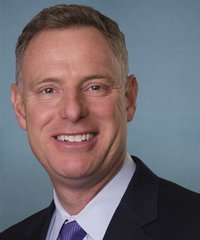
Congressman Scott Peters serves California’s 52nd Congressional District, which includes the cities of Coronado, Poway and most of northern San Diego. First elected in 2012, Scott commits to working with anyone in good faith to fix a broken Congress. Scott Peters currently serves on the House Budget Committee and the House Energy and Commerce Committee, as well as the Joint Economic Committee.
San Diego is a proud military town and a strategic partner in the national defense. In an era of new and dynamic threats, we need to ensure our service members have the resources and technology they need to fight our enemies abroad and keep Americans safe at home. This also means that our military must be prepared for any event, including the consequences a changing climate has on its operations. I will continue advocating for funding to expand the military’s investment in San Diego, which supports job creation and drives one-fifth of our region’s economy. Finally, the United States is a leader in both diplomacy and strength, and I believe we must always work toward smart, diplomatic solutions when faced with threats to American interests and the interests of our long-standing allies.
The 52nd District is home to a large military presence, including Naval Air Station North Island, Naval Air Base Coronado, Naval Base Point Loma, Naval Base San Diego, Marine Corps Recruit Depot San Diego, Coast Guard Sector San Diego, and Marine Corps Air Station Miramar.
The National Defense Authorization Act (NDAA) annually provides the necessary authorities and funding for America’s military, including procurement, operations and maintenance, and personnel matters. As part of the NDAA process, Scott advocated for numerous issues that affect the San Diego region and its economy including a strong naval fleet, robust funding for research and development, a more streamlined acquisition process, and an increased focus on DoD energy security and efficiency.
Scott also led a successful effort in 2014 to transfer $120 million that had been unnecessarily appropriated to a dead project in South Carolina, a so-called ‘zombie earmark,’ to instead pay for 8 additional Unmanned Aerial Vehicle (UAV) MQ-9s that were an unfunded priority of the Air Force. These UAVs are developed in Poway, CA, and support high-skilled jobs in the district.
Scott is strong supporter of a robust naval fleet capable of meeting the global demands placed on the Navy. He supports a fleet of eleven aircraft carriers and sent a bipartisan letter to Secretary of Defense Chuck Hagel to affirm it. He has also advocated for continued funding of the Maritime Security Program, a public-private partnership which guarantees that America flag commercial vessels and American crews will be available to ‘answer the call’ for enhanced sealift to transport supplies and equipment required by our military.
In April 2014, Scott, along with Senator Mark Udall, introduced the bicameral Department of Defense Energy Security Act (DODESA), which will help the U.S. Department of Defense reduce energy use, boost combat effectiveness, and speed up the development of advanced military technologies. Scott introduced this legislation because energy security is a national security imperative, and taking measures to improve energy efficiency and reduce fuel consumption means a more capable and ready military.
Scott is also a strong supporter of the development of biofuels for our military. He is cosponsor of the Biofuels Development Act, which establishes a $25 million pilot program for the Air Force to make competitive grants to support research and development, education, and training to produce a bio-based aviation fuel for use by the Air Force. He also supports the biofuel efforts of the Departments of Defense, Energy, and Agriculture through the Defense Production Act to process military biofuel supplies, which supports energy independence of the U.S. military.
As a tireless advocate for veterans and their transition out of the military, Scott is a cosponsor of Incentives for our Nation’s Veterans in Energy Sustainability Technologies (INVEST) Act. The bill expands the Work Opportunity Tax Credit (WOTC) to employers who hire veterans with a certification for renewable energy technology or have used their Montgomery GI bill to complete vocational training in renewable energy fields.
Scott supports targeted airstrikes to thwart the advance of the Islamic State in Syria and the Levant (ISIL). He voted to authorize the President to train and equip moderate Syrian opposition forces to fight ISIL so that they are capable of countering ISIL on the ground and defending themselves and their nation, and denying ISIL a safe haven.
Scott is committed to preventing a nuclear-armed Iran. He has voted to strengthen sanctions and is a co-sponsor of the Nuclear Iran Prevention Act of 2013 which designates Iran’s Revolutionary Guard Corps as a “foreign terrorist organization,” and imposes stiff economic sanctions on Iran.
Scott is also a co-sponsor of the Hezbollah International Financing Prevention Act, which curtails Hezbollah’s global logistics and financial network, and is a cosponsor of the Iron Dome Support Act which authorizes the President to provide assistance for the procurement, maintenance, enhancement, and sustainment of additional Iron Dome defense systems for Israel.